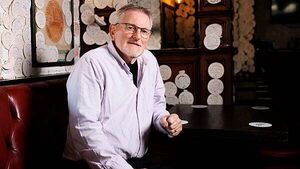Prostate cancer survivor backs campaign for sanitary bins in men’s toilets

By Gráinne Ní Aodha, PA
Calls have been made to put sanitary bins in men’s bathrooms to support those recovering from prostate cancer.
Gerry Connolly, from Co Donegal, was diagnosed with prostate cancer in 2013 and said he did not realise how difficult coping with urinary incontinence would be after surgery.
The semi-retired stationery salesman, 69, said while he was prepared for the life-saving treatment itself, he was not ready for the daily challenges that followed.
“Nobody really warned me what incontinence would be like afterwards,” said Mr Connolly.
“For months I would wet myself when I stood up, coughed or laughed. It was very frustrating and such unfamiliar territory.
“I felt embarrassed about it, even though I know I shouldn’t have. I used to make any excuse not to leave the house and I rarely left it for months.”
Mr Connolly shared his story as part of Dispose With Dignity, a new awareness campaign from hygiene services company phs Group which is supported by the Irish Cancer Society and the Irish Men’s Sheds Association.
If people see bins for men, it’ll start conversations and remind more men to get tested early. That could save lives
It aims to tackle the stigma around male incontinence and improve access to hygiene facilities such as sanitary bins and vending products in men’s washrooms nationwide.
A similar initiative has taken place in Great Britain.
As many as half of all men who undergo prostate removal will experience urinary incontinence.
As the campaign launched on Thursday at an Irish Cancer Society conference in Dublin, Mr Connolly said: “If there’d been sanitary bins in men’s toilets, maybe I’d have felt I had options – somewhere private to change a pad and get on with my day.
“Even now, I still use a pad. Having a bin in the cubicle would make a huge difference. It’s about dignity, not shame.”
Mr Connolly also hopes such visible facilities will help raise awareness of prostate cancer.
“If people see bins for men, it’ll start conversations and remind more men to get tested early,” he said. “That could save lives.”
Research from iReach, commissioned by phs Group, highlighted the impact urinary incontinence has on men’s confidence and mental health.
Of the 702 men surveyed, more than half (52 per cent) said they feel anxious about going out in public due to a lack of suitable toilet facilities, while 65 per cent have been negatively affected by not being able to find a toilet when needed.
Among younger men, aged 18–34, the mental health impact is particularly severe, with 41% reporting anxiety and 24 per cent depression.
Michelle Lonergan, a cancer awareness nurse with the Irish Cancer Society, said: “One in six men will be diagnosed with prostate cancer, and life-saving treatment can often lead to lasting side-effects such as urinary incontinence that can profoundly affect confidence, social life and wellbeing.
“We urgently need greater awareness of the challenges men face and better facilities that support their dignity as they navigate life through and after cancer.”





